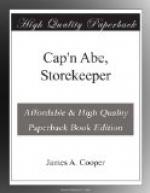“That’s right, Cap’n Am’zon,” said Cap’n Joab. “Ye say a true word.”
“An’ for good reason,” declared the mendacious storekeeper. “I’ve had experience with such sharks,” and he ran his finger reflectively down the old scar upon his jaw.
“I always wanted to ask you ’bout that scar, Cap’n Am’zon,” put in Milt Baker encouragingly. “Did you get it in a mutiny?”
“Yep.”
“I didn’t know but ye got it piratin’,” chuckled Milt. “Bet Gallup, she swears you sailed under the Jolly Roger more’n once.”
“So I did,” declared the captain boldly. “This crew o’ mutineers I speak of turned pirates, and they held me—the only one of the afterguard left alive—to navigate the ship.
“Guess mebbe you’ve heard tell, Cap’n Joab, of the mutiny of the Galatea?” went on the narrator unblushingly.
His fellow skipper nodded. “I’ve heard of it—yes. But you don’t mean to say you sailed on her, Am’zon?”
“Yes, I did,” the storekeeper declared. “I was third aboard her—she carried a full crew. She sailed out o’ N’York for Australia and home by the way of the Chile ports and the Horn—a hermaphrodite brig she was; and—she—could—sail!
“But she warn’t well found. The grub was wuss’n a Blue-nose herrin’ smack’s. Weevilly bread and rusty beef. The crew had a sayin’ that the doc didn’t have to call ’em to mess; the smell of it was sufficient.
“They was a hard crew I allow—them boys; many of ’em dock rats and the like. Warn’t scurcely half a dozen able seamen in the whole crew. And the skipper and mate was master hard on ’em. In the South Atlantic we got some bad weather and the crew was worked double tides, as you might say.
“The extry work on top o’ the poor grub finished ’em,” said the storekeeper. “One day in the mornin’ watch the whole crew come boilin’ aft and caught the skipper and the mate at breakfast. They lived well. The second was in his berth and I had the deck.
“I got knocked out first thing—there’s the scar of it,” and the captain put a finger again on the mark along his jaw which actually was a memento of contact with the cellar step when he was a child. “Belayin’ pin. Knocked me inside out for Sunday. But I cal’late they didn’t put the steel to me ’cause I’d been fairly decent to ’em comin’ down from N’York.
“Then, after the fight was over and they’d hove the others overboard, they begun to see they needed me to navigate the Galatea. They give me the choice of four inches of cold steel or actin’ as navigator—the bloody crew o’ pirates!”
“And what did ye do?” demanded Amiel Perdue, his mouth ajar.
“Well,” snorted the storekeeper, “ye can see I didn’t choose a knife in my gizzard. We sailed up an’ down the coast of Brazil and the Guineas for two months, sellin’ the cargo piecemeal to dirty little Portugee traders an’ smugglers. Then we h’isted the black flag and took our first prize—an English barque goin’ down to Rio. It was me saved her crew’s lives and give ’em a chance’t in their longboat. They made Para all right, I heard afterward.




